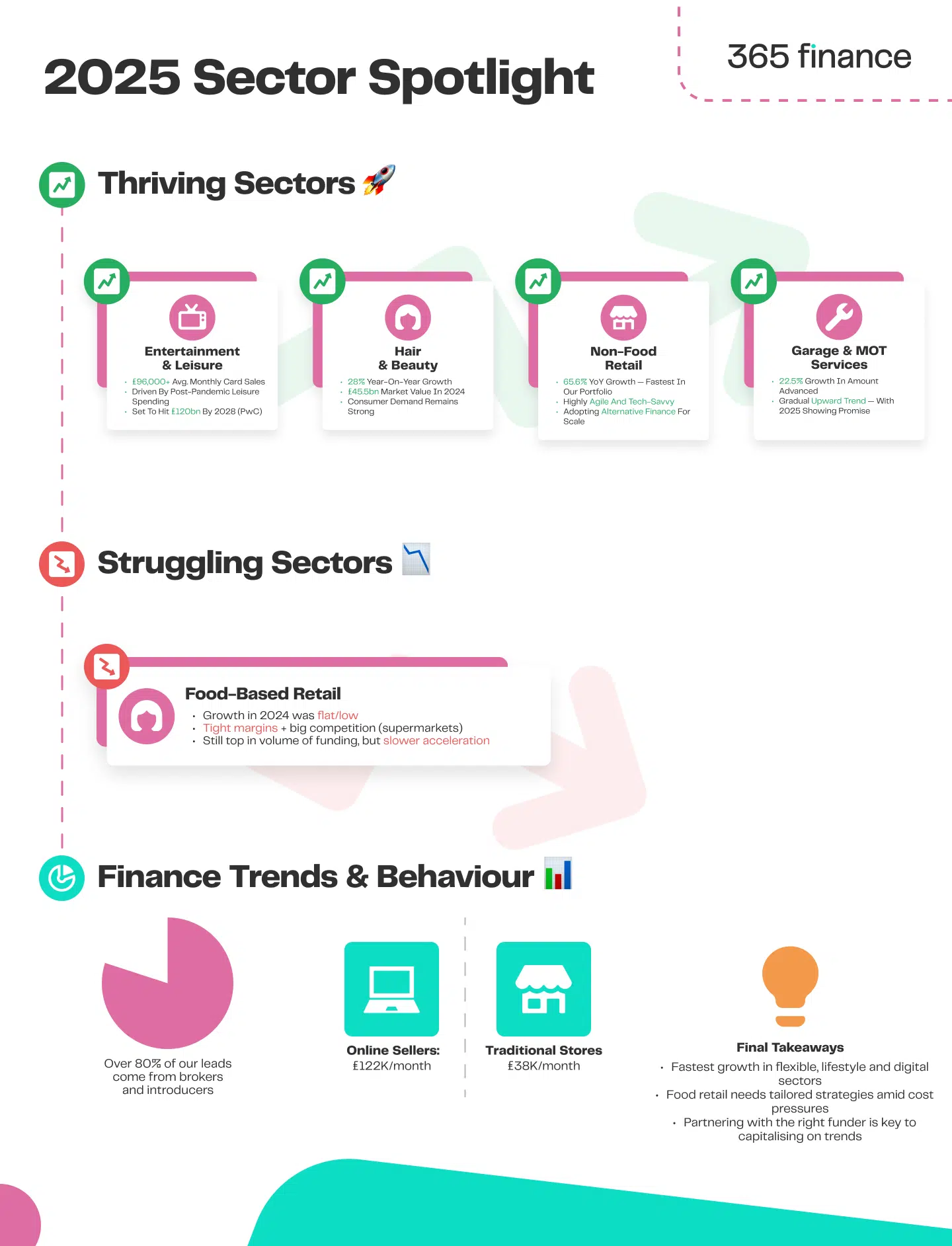2025 Sector Spotlight: Which UK Business Sectors Are Thriving (And Which Are Struggling)
Written by Team 365 Finance

Last year, we helped fund over 3,000 small businesses across the UK. From this, we’ve gathered a wealth of information on how various sectors are performing – and the differences between them are significant.
2024 was a tough year for many small businesses and 2025 has already posed many challenges. With higher-than-expected inflation rates making it likely that The Bank of England will cut interest rates three more times this year, the impact of recent tariffs and overall uncertainty around the state of SME funding, it’s an important time to look to data and trends to inform how to help businesses thrive.
In this article, we’ll take a look through a year’s worth of data, providing insights into what’s driving sector-specific trends and how businesses can position themselves for success. Whether you’re a small business trying to grow or a broker scouting high-value deals, this data should offer clarity on your next business decision.
What Sectors Are Thriving?
At 365 Finance, we lend to a variety of businesses across the UK. Based on our data, here are some sectors that have seen the highest growth over the previous calendar year.
Entertainment and Leisure
Businesses in the entertainment and leisure sectors averaged over £96,000 in monthly card sales over the 2024 calendar year, according to our data. This is a significant rise from the previous year where monthly card sales averaged £56,254.
Much of this growth could be attributed to a general increase in consumers prioritising spending on leisure activities post-pandemic. The industry is also set to continue its growth; according to a pwc report, it could be worth over £120bn by 2028. With further investment into the industry, like the £10 billion going in to London’s experience economy over the next ten years, it’s a sector with a lot of potential.
Hair and Beauty
Another sector that has been going in the right direction is hair and beauty. The sector has demonstrated a 28% year-on-year growth in the last calendar year.
This is in line with other industry reporting. Despite the ongoing cost-of-living crisis, UK consumers are still spending big on beauty products with the market hitting a value of £45.5bn in 2024, following three consecutive years of growth. It’s not going to stop there, either. Many experts expect the industry to see notable growth in 2025, a good sign for small businesses and investors in the sector.
Non-Food Retail
Although reports of the dying high street may convince you otherwise, our data suggests that non-food retail is experiencing a renaissance. In fact, we saw a 65.6% growth in the sector during the 2024 calendar year – this makes it the fastest-growing segment in the 365 Finance portfolio.
As consumer behaviour changes, non-food retail businesses have had to adapt and become more agile. By being more flexible, they’re able to better react to market trends and meet evolving customer needs.
Businesses in this sector are also more open to exploring alternative financial solutions, like revenue-based finance, as a tool to boost their growth and invest in new opportunities.
Garage and MOT Businesses
Finally, a sector that is slowly seeing increased growth is the garage and MOT sector, which had a 22.5% growth in the total amount advanced over the 2024 calendar year.
Although growth figures aren’t as high as some of the other industries, we think this could be the start of more rapid growth to come in 2025.
Struggling or Slower Sectors
While there are plenty of sectors that are showing strong signs of growth, our data has highlighted that traditional retail (food-based) is growing at a much slower rate and may need more strategic financial support.
Considering the growth in non-food retail businesses, it may be surprising to see that the traditional retail sector has not seen the same level of growth.
With the rising costs of doing business, tight margins and fierce competition from larger supermarket chains, growth can be much harder to achieve for independent shops and food retailers.
It’s important to note that, even though the sector hasn’t seen the same level of growth as others, it still remains one of our top sectors in terms of the amount of advances. You could conclude that the smaller growth figures indicate stable market positioning rather than hints of a potential decline in the future.
Funding Trends Across Sectors
From the businesses we analysed, we uncovered plenty of interesting insights into funding trends across sectors.
Over 80% of our leads come from brokers and introducers, which has always been our top source. However, we’ve also started to see an increase in email and social referrals. Although they generate far fewer leads than brokers, these deals have yielded much higher average values (upwards of £35,000), particularly in the Retail-Food sector.
This demonstrates to us that new online tools are becoming much more popular and, as we continue to build relationships with our brokers, looking to digital tools as new ways to increase the number of deals and advances we offer.
We’ve also noticed that online businesses are processing £122,000+ in average monthly card sales, which is nearly four times higher than the traditional retail businesses where the average monthly card sales are £38,000.
This may be because online businesses are quicker to adopt new technologies and are increasingly turning to merchant cash advances to fund innovative projects. It may also be that they are able to be more nimble than your typical bricks and mortar businesses as they aren’t restricted by physical premises and equipment.
Takeaways for Brokers
If you’re a broker looking through this data and wondering how it impacts you and your clients, let us break it down for you.
It’s a good idea to take a look at the sectors we’ve witnessed significant growth in, how does it compare to your portfolio? If there are any sectors you’re not currently working with, it could be an untapped market for you to explore.
If you’re working with businesses in slow or growing sectors, it’s important to match them with the right financing solutions that fuel their growth.
2024 was a record-breaking year for us at 365 Finance, increasing our total amount advanced by 11% and collaborating with strategic partners, introducers and referral channels for over 80% of our deals. We also saw a 80% renewal rate, which comes from building lasting relationships with our clients.
We work with brokers to support thousands of businesses across the UK, providing fast and flexible revenue-based financing. Unlike traditional bank loans, repayments mirror the ups and downs of your client’s business.
We offer a 90% approval rate and approval within 24 hours to help your clients raise between £10,000 and £500,000. If your clients aren’t able to secure funding from traditional banks, or feel put off by getting tied into fixed monthly payments, it may be time to suggest alternative financing options.
Conclusion
With data from over 3,000 UK businesses, we’ve offered a granular view of where sector-specific funding is heading.
Our data shows that thriving sectors are not just surviving, they are using innovation and alternative methods of finance to boost their growth and expand their operations. It also highlights how some of the sectors that may not be experiencing such high growth require more support from brokers and strategic financing solutions.
Whether you’re a broker or a small business owner, knowing how the different sectors are performing in relation to other is important to a successful 2025. If you’d like to talk about these trends in more detail, please get in touch with our Partnerships team.
At 365 Finance, we provide revenue-based funding of £10,000 to £500,000 in capital so your customers can thrive all year round. We collaborate with thousands of UK brokerages, providing unsecured finance solutions to small businesses – and market-beating commissions for you as an introducer.
To find out more, please contact a member of our partnerships team or head to our website.
